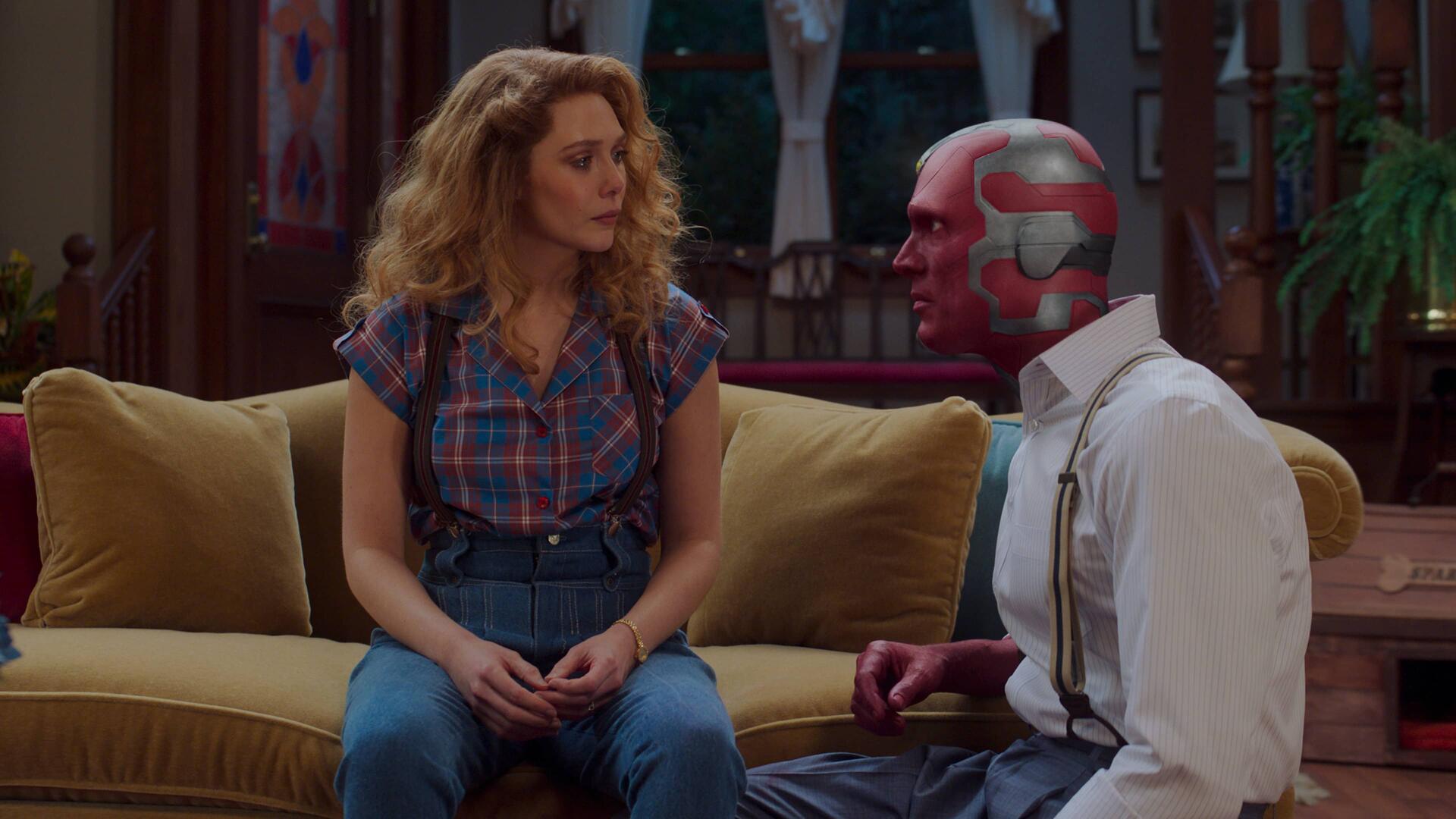WandaVision is the first part of Marvel’s new initiative for incorporating TV series into the MCU. Rather than the long ongoing series like Agents of Shield, or more street-level series that are superheroic but smaller in scope than the Netflix series, these are more limited series that are more limited in scope, while also involving some of the actual Avengers. In the case of WandaVision, they’re also starting off with a series that is considerably more experimental in style and far more personal in tone than the main films.
There will be spoilers below the cot.

WandaVision is two things. First off, it is a love letter to all of the various eras of sitcoms, focusing on the things that people have grown to love about the genre and has helped it endure – comedy about lasting relationships between characters, and the ways in which they help us reflect on our own frustrations and stressors with laughter. The various episodes of the series have the framework of Wanda and Vision in a series of sitcom episodes from various decades, starting from the 1950s and moving into the present day, following the two of them through their lives in the town of Westview, New Jersey, as a married couple, having children, and interacting with their community while also trying to conceal their powers.
However, the show also makes it clear almost from the jump that something is very off with this sitcom reality, aside from two characters we know of from the present day being in realities from the very far past. The question becomes why are they in this environment, and when it turns out that Wanda is the person responsible for creating this unreal reality, the story basically gets into why, and that’s where the other thematic one-two punch of the story comes in – because for those who remember Avengers: Infinity War and Avengers: Endgame, while Wanda Maximoff was dusted during The Snap, and returned 5 years later in The Blip – Vision was not only very much dead before that happened, his death allowed Thanos to carry out The Snap.
So, WandaVision is also about grief, trauma, working through them, and also making it clear that sometimes people who are working through that grief and trauma can lash out and hurt others. And we get that side of the equation from our three main outside observers, all of whom are in some matter Avengers adjacent – Jimmy Woo, the FBI agent who has come up in the Ant-Man movies; Darcy Lewis, the former sidekick to Jane Foster in the Thor movies who now has her own doctorate in Astrophysics; and Monica Rambeau, the character who was the teenage daughter to Carol Danvers’ Air Force buddy Maria Rambeau in Captain Marvel, now an adult and working for SWORD.
In particular, Maria died of cancer during the five year time jump, so Monica missed her mother’s death, and is also grieving, giving her a different perspective on what’s happening inside Westview, as it becomes clear that Wanda has some control, whether intentional or unintentional, over what’s happening inside the town, and with the ultimate realization that while Wanda has to release her hold on the town, it has to be done by getting her to work through her grief, not by killing her.
The story also adds the complication of Wanda’s show-within-a-show meddling next-door neighbor Agnes who, as internet memes have spoiled to hell, was actually Marvel character Agatha Harkness all along. While Agatha’s intentions are certainly not the best, it’s Agatha who provides the other push by discovering that Wanda is a Reality Warper, that she had some limited form of this power for quite some time (until it got pumped up thanks to Hydra and the Mind Stone) – but even then her use of the power was very intuitive and rarely directed and intentional, up to and including creating this sitcom reality almost by accident.
This gets into where WandaVision takes what I think is a very big risk to do with the MCU, but which works well, and was a good choice to make. Specifically, Wanda is doing what would generally be considered a super-villainous act (mind-whammying a small town full of people), but puts in the context of a person experiencing grief and trauma lashing out, unintentionally hurting people because they themselves are hurting. It also takes the next step of not irredemably condemning Wanda for that. It acknowledges her trauma and the trauma she is causing, but that the first does not excuse the second. It gives a level of complexity and dimensionality that breaks from the stereotype of “comic book villainy”, which is also in keeping with the level of general complexity that Marvel has tried to give their villains (that weren’t Actual Nazis) in the past.
It makes me very interested to see what happens with Wanda in Doctor Strange in the Multiverse of Madness. And also I really want to pick up the Blu-Ray to watch the audio commentaries.
WandaVision is currently available for streaming on Disney+ with a subscription.
Please support my Patreon: http://www.patreon.com/countzeroor
Buy me a coffee at Ko-Fi: https://ko-fi.com/countzero
Watch my Live-Streams on http://twitch.tv/countzeroor
Check out my Let’s Plays at https://www.youtube.com/@CountZeroOrPlays


Pingback: Falcon and the Winter Soldier: TV Review - Breaking it all Down